|
|
|
Sort Order |
|
|
|
Items / Page
|
|
|
|
|
|
|
| Srl | Item |
| 1 |
ID:
073581
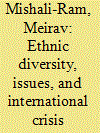

|
|
|
|
|
| Publication |
2006.
|
| Summary/Abstract |
Ethnic conflict is prominent and recurrent in contemporary world politics, expressed in both internal and international disputes. The main goal of this study is to link ethnic conflict at the state level and its spillover to international conflict and crisis. More specifically, it examines the relationship between particular ethnic dimensions and international crises. The examination focuses on ethnic diversity among adversaries and ethnic issues within interstate confrontations, and their effects on crisis dynamics. The analysis links two major datasets: the Minorities at Risk (MAR) Project, which characterizes worldwide ethno-political actors of several types, and the International Crisis Behavior (ICB) Project, which analyzes international conflicts and crises across the world. Analyses of 133 ethnic-related international crises in the period 1918-2002, in which 67 ethno-political actors were involved, reveal the multidimensional impact that ethnicity has upon international conflict. Ethnic conflict increases the complexity and danger inherent in international crisis. The presence of ethnic diversity extends crisis duration, increases the level of its violence, and impedes accommodative crisis outcome. Moreover, the changing world order is characterized by a shift in the issue agenda. Ethnic issues related to identity and to political and economic status, which mainly concern non-state political actors, create both intrastate and interstate confrontations and shape the behavior of major actors on the world stage. Different ethnic issues in crises have diverse influences on crisis process and outcome.
|
|
|
|
|
|
|
|
|
|
|
|
|
|
|
|
| 2 |
ID:
158226
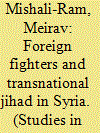

|
|
|
|
|
| Summary/Abstract |
Foreign fighters arrive in Syria from across the Muslim world, yet the configuration of their countries of origin remains a puzzle. Examining alternative explanations for joining transnational jihad, the article draws insights from the cases of Tunisia and Saudi Arabia, two major countries of foreign fighters' origin, compared with Egypt, from where limited figures of volunteers have joined the Syrian war. The article shows that the sources of volunteering fighters may be well understood in combined terms of religious sentiments and national politics. Foreign fighters come largely from Muslim countries where restrained state–Islamists relations channel Islamic grievances to transnational arenas.
|
|
|
|
|
|
|
|
|
|
|
|
|
|
|
|
| 3 |
ID:
185164
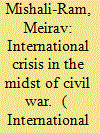

|
|
|
|
|
| Summary/Abstract |
This article examines the nexus between international crises and civil wars. Based on the premise that not all simultaneous civil and international conflicts are related, the study aims to explore the circumstances in which civil wars affect violent escalation in international crises. The study identifies ‘composite’ crises – where the civil war is the core issue of the international dispute – as a unique subset of international crises. These crises are distinguished from ‘unrelated-civil war’ situations, in which the issues in the internal and international conflicts are separate. Using data from the ICB, COW, and UCDP/PRIO datasets, the article tests a dual-conflict argument, positing that interconnected issues and interactions between actors in composite situations inhibit moderate crisis management and aggravate interstate behavior. The findings show that while civil war in composite situations has a negative impact on crisis escalation, unrelated-civil war has an inverse impact on interstate relations in crisis.
|
|
|
|
|
|
|
|
|
|
|
|
|
|
|
|
| 4 |
ID:
184195
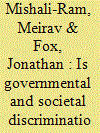

|
|
|
|
|
| Summary/Abstract |
This study asks whether governmental and societal discrimination against Muslim minorities explains the outflow of foreign fighters from non-Muslim-majority countries to Syria and Iraq. We use data from the ICSR, Soufan Group, Pokalova (2018), and RASM datasets to examine the connection between discrimination directed at Muslim minorities and the number of foreign fighters originating in a country. We apply grievance-based theory to examine whether minority-specific objective discrimination is behind the phenomenon. We find little evidence that discrimination increases the outflow of foreign fighters, but this outflow is higher from wealthier countries. The findings indicate that if grievances are a motivation for individuals to become foreign fighters, they are not connected to objective discrimination. This implies that at least some of the grievances relate to personal circumstances or that immigrant minorities are more likely to perceive inequality in wealthier countries.
|
|
|
|
|
|
|
|
|
|
|
|
|
|
|
|
| 5 |
ID:
146709
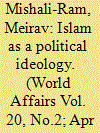

|
|
|
|
|
| Contents |
This article explores the sources of civil strife in Pakistan. It addresses the ongoing theoretical debate on the sources of violent strife, which distinguishes between material and perceptual causes of conflict and places sub-national identities within the context of political and socioeconomic circumstances. The article uses the BFRS Dataset of Political Violence in Pakistan to examine a wide array of deadly incidents from 1988 to 2011. It argues that among the various causes of the continuing conflict, the most prevailing source lies in the role assigned to Islam in Pakistan’s political ideology. In searching for an inclusive nationalism to unite micro identities loosely knitted together within the nation, Pakistan’s elites have drawn on Islam, which had been utilised as the founding logic of the state. In doing so, they have persistently promoted a message of Islamism that has now become the major source of internal strife.
|
|
|
|
|
|
|
|
|
|
|
|
|
|
|
|
| 6 |
ID:
120338
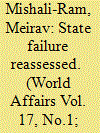

|
|
|
| 7 |
ID:
106845
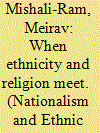

|
|
|
|
|
| Publication |
2011.
|
| Summary/Abstract |
This article offers a framework for understanding civil strife, synthesizing subnational and transnational dimensions of kinship ties. While existing research generally distinguishes between intrastate and interstate factors of civil war, this study posits that it is the combination of linked ethnic and religious identity traits of groups within the state, and the existence of cross-border affinity ties, that serve as a feeding mechanism of civil strife. Such a synthesized viewpoint is most applicable in the case of the Pashtuns who live on both sides of the Afghan-Pakistani border. Loosening the solid Pashtun affiliations and controlling border politics necessitate a nation-building process to "domesticate" the Pashtuns and integrate them into state politics, so that their tribal and national loyalties will correspond.
|
|
|
|
|
|
|
|
|
|
|
|
|
|
|
|
| 8 |
ID:
140735
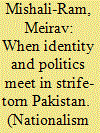

|
|
|
|
|
| Summary/Abstract |
This article analyzes the complex relationships between identity, politics, and civil strife. The author challenges the material, structural, and functionalist approaches to ethnic conflict that undervalue the role of ethnic and religious identities in communal behavior, seeing them as instrumental factors of civil strife. The article focuses on the intersection of identity and politics in Pakistan, addressing attributes of state and substate actors that jointly shape collective behavior. It aims to show how interactions between the state and substate groups outline “the politics of identity,” in which cultural and material concerns jointly define the agendas of kinship networks. The review of the complex Pakistani scene shows that the intersection of sectarian identities and politics generates fierce conflict that threatens to tear Pakistan apart, yet the confluence of ethnic networks and politics keeps the strife-torn country together.
|
|
|
|
|
|
|
|
|
|
|
|
|
|
|
|
|
|
|
|
|